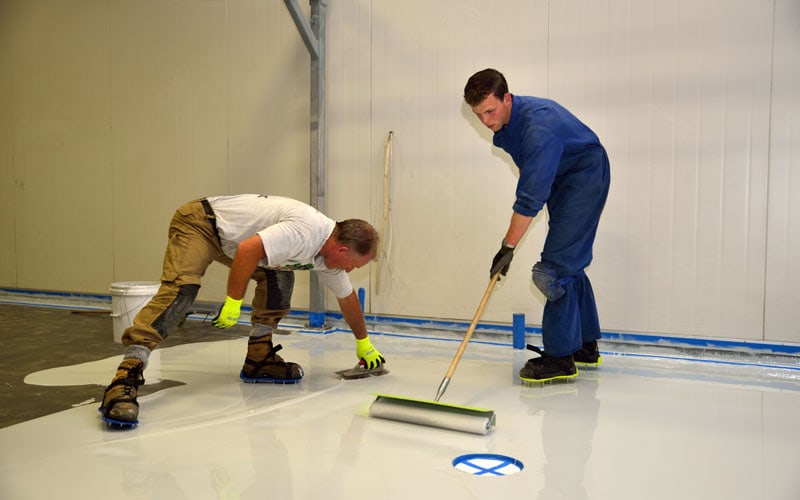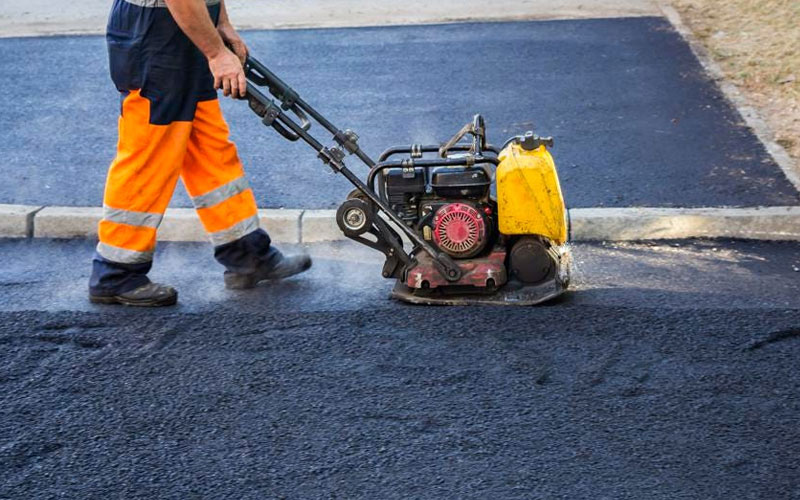
Market experts estimate the global epoxy resin industry to be worth $12.8 billion this 2022. By 2030, they forecast it to nearly double in size and reach a revenue of $22.4 billion.
The flooring industry, in turn, is among the leading users of epoxy resin. Epoxy flooring, after all, is customizable and exceptionally durable. That makes it an excellent choice for areas with constant and heavy traffic.
But what exactly is epoxy, and what makes it ideal as a business or home flooring solution? Which areas of your commercial or residential property can benefit most from it?
We’ll answer all those questions in this guide, so read on.
What Is Epoxy Flooring?
Also called resinous flooring or polymer flooring, epoxy flooring is a two-part mixture. The first is a resin; the other is a hardener.
The resin and hardener instigate a chemical reaction when mixed and laid over a surface. That results in the two-part mixture bonding to the substrate.
Concrete, tile, wood, and VCT are some examples of surfaces where you can apply epoxy resin. Correctly applied and cured, epoxy floor coatings withstand time and rugged use. That’s also why they’re popular in warehouses, commercial buildings, and industrial sites.
What Characteristics Make Epoxy Floors Fantastic?
Whether wood, tile, or concrete, epoxy can coat them at a cost lower than other floor finishes. It also has properties that allow it to resist chemicals, fire, heat, and substances. It even provides limitless design and customization options.
Long-Term Affordability
According to the home improvement website Bob Vila, an epoxy garage floor in the U.S. can cost between $1,447 and $3,006. However, the national average is $2,227.
That’s more expensive than tiles or concrete polishing, but epoxy lasts longer. So while you may have to pay more upfront for epoxy, you still get to save since you don’t have to replace it sooner.
Excellent Resistance to Chemicals and Water
Epoxy coatings have excellent resistance to over 100 chemicals. These include acetic acid, alcohol, ammonia, gasoline, oil, and salt water, to name a few.
Epoxy also has good resistance to chemicals like hydrochloric acid and phosphoric acid.
Easy to Clean and Maintain
Once completely cured, epoxy creates a non-porous, sealed, sleek, and smooth surface. The seal it forms on top of the substrate prevents the absorption of substances. That’s another reason it resists chemicals and liquids and is also why it’s super easy to clean.
So when you spill something on an epoxy-coated floor, you can wipe or mop it up. There’s no need for back-breaking brushing or scrubbing.
High Heat Resistance
Epoxy usually withstands heat levels of 300 °F for short periods. However, some epoxy coatings use specialized formulas that let them withstand up to 600 °F.
Epoxy with higher heat resistance is an excellent choice for high-demand environments. These include car repair and modification shops, factories, and laboratories. It’s also ideal for professional kitchens where scalding hot spills are typical.
Fire-Resistant
Cured epoxy is fire-resistant and doesn’t catch fire. In the event of a fire, it won’t trigger more flames to form. It will melt but won’t worsen the fire since it won’t spread the flames.
Countless Design and Customization Options
Epoxy resin, at its core, is transparent. However, manufacturers now offer it in many colors like white, black, red, gray, and blue. Some even allow you to dictate a specific color you want, and they’ll mix it for you.
You can also customize epoxy floor coatings to create unique and pretty designs. For example, you can make flakes, logos, or geometric patterns.
Where Can You Use Epoxy Floorings?
Epoxy floorings are ideal for any area that receives plenty of foot traffic. These include commercial and residential bathrooms, kitchens, and receiving areas. These hard-wearing floors are also excellent options for highly frequented storage rooms.
You might also want to consider an epoxy floor for the basement of your home or place of business. One reason is that it can help minimize potential flood or water damage. That’s again thanks to its excellent water-resistant properties.
If you’re considering garage remodeling, a new floor coating is a worthy investment. You can use epoxy to make your garage floor resistant to gas, oil, and other fluid leaks and splashes.
If you have a home or commercial workshop, an epoxy floor is an ideal addition to it. It can help protect your existing floor from damage caused by chemicals.
Do Epoxy Floors Have Disadvantages?
Of course, for instance, it can be slippery when wet. Ironically, this has to do with epoxy’s water-resistant properties. It doesn’t absorb water, and because it creates a smooth surface, it can be a slip hazard.
The good news is that additives like aluminum oxide or silica can make epoxy anti-slip. Some manufacturers also offer epoxy resin kits with added anti-slip materials.
Also, before applying an epoxy coating, you must rigorously prepare the floor. That entails removing all contaminants, such as debris, dirt, dust, gas, grease, oil, or stains. A contaminated surface can cause the epoxy to fail to adhere and cure completely.
Another drawback to installing epoxy flooring is that it can take a few days to cure completely. During this time, the coating must always remain dry to set correctly.
While an epoxy coating is durable, it’s not permanent, and you’d have to replace it after a few years. You must also repair damages like chips and cracks without delay, as they can cause the coat to peel away. If that happens, the substrate is at risk of exposure and damage.
Enjoy the Benefits of Epoxy Flooring
Epoxy flooring is ideal for many applications, including garages, basements, and living rooms. It’s durable, affordable, very resistant to damage, and customizable. And even if it won’t last forever, replacing it won’t break the bank.
Just remember to add or choose an anti-slip epoxy coating for surfaces that tend to get wet or oily. That way, you can make your epoxy-coated floors safer for everyone.
Did you find this guide informative? If so, we have more educational guides to share, so be sure to check out our other blog posts now!







